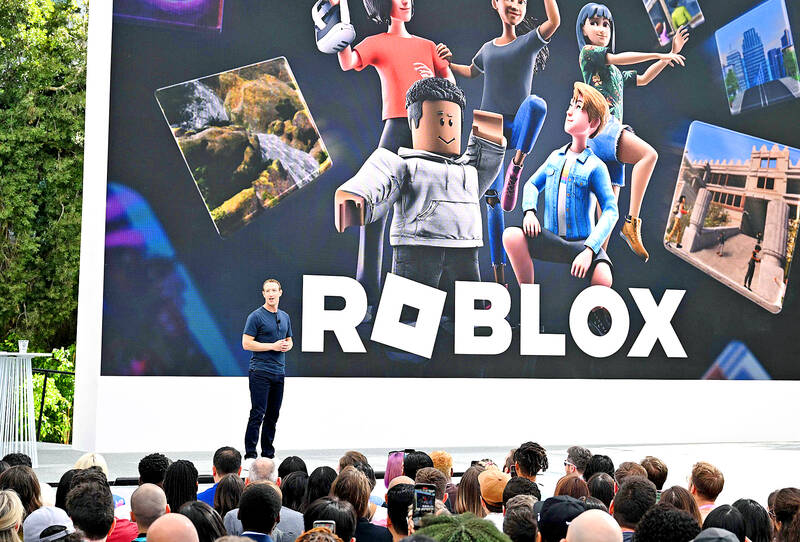Meta Platforms Inc chief executive officer Mark Zuckerberg on Wednesday said the tech giant is putting artificial intelligence (AI) into digital assistants and smart glasses as it seeks to gain lost ground in the AI race.
Zuckerberg made the announcements at the Connect developers conference at Meta’s headquarters in Silicon Valley, the company’s main annual product event.
“Advances in AI allow us to create different [applications] and personas that help us accomplish different things,” Zuckerberg said at the gathering.

Photo: AFP
“And smart glasses are going to eventually allow us to bring all of this together into a stylish form factor that we can wear,” he said
Smart glasses are one of the many ways that tech companies have tried to move beyond the smartphone as a user-friendly device, but so far with little success.
The second-generation Meta Ray-Ban smart glasses made in a partnership with EssilorLuxottica is supposed to have a starting price of US$299 when they hit the market on Oct. 17.
The smart glasses also add the ability for users to stream what they are seeing in real time, Zuckerberg said.
“Smart glasses are the ideal form factor for you to let AI assistants see what you’re seeing and hear what you’re hearing,” he said.
Meta also introduced 28 AI characters that people can message on WhatsApp, Messenger and Instagram with “personalities” based on celebrities including Snoop Dogg, Paris Hilton and YouTube star MrBeast.
Zuckerberg demonstrated an interaction with one such AI character from the stage in a type-written chat, promising that the new bots would soon be voiced.
“This is our first effort at training a bunch of AI that are a bit more fun,” Zuckerberg said.
“But look, this is early stuff and these still have a lot of limitations, which you will see when you use them.”
Meta has taken a much more cautious approach than its rivals Microsoft Corp, OpenAI and Google to push out AI products, prioritizing small steps and making its in-house models available to developers and researchers.
The company also unveiled the latest version of its Quest virtual reality headset with richer graphics, improved audio and the ability for a wearer to see their surroundings without taking the gear off.
“This is going to be a big game changer and a big capacity improvement for these headsets,” Zuckerberg said.
Quest 3 headsets are priced starting at US$499 and should begin shipping on Oct. 10, according to Meta.
This is substantially cheaper than Apple Inc’s Vision Pro, which is slated to cost a hefty US$3,499 when it becomes available early next year, in the US only.

CHIP RACE: Three years of overbroad export controls drove foreign competitors to pursue their own AI chips, and ‘cost US taxpayers billions of dollars,’ Nvidia said China has figured out the US strategy for allowing it to buy Nvidia Corp’s H200s and is rejecting the artificial intelligence (AI) chip in favor of domestically developed semiconductors, White House AI adviser David Sacks said, citing news reports. US President Donald Trump on Monday said that he would allow shipments of Nvidia’s H200 chips to China, part of an administration effort backed by Sacks to challenge Chinese tech champions such as Huawei Technologies Co (華為) by bringing US competition to their home market. On Friday, Sacks signaled that he was uncertain about whether that approach would work. “They’re rejecting our chips,” Sacks

NATIONAL SECURITY: Intel’s testing of ACM tools despite US government control ‘highlights egregious gaps in US technology protection policies,’ a former official said Chipmaker Intel Corp has tested chipmaking tools this year from a toolmaker with deep roots in China and two overseas units that were targeted by US sanctions, according to two sources with direct knowledge of the matter. Intel, which fended off calls for its CEO’s resignation from US President Donald Trump in August over his alleged ties to China, got the tools from ACM Research Inc, a Fremont, California-based producer of chipmaking equipment. Two of ACM’s units, based in Shanghai and South Korea, were among a number of firms barred last year from receiving US technology over claims they have

BARRIERS: Gudeng’s chairman said it was unlikely that the US could replicate Taiwan’s science parks in Arizona, given its strict immigration policies and cultural differences Gudeng Precision Industrial Co (家登), which supplies wafer pods to the world’s major semiconductor firms, yesterday said it is in no rush to set up production in the US due to high costs. The company supplies its customers through a warehouse in Arizona jointly operated by TSS Holdings Ltd (德鑫控股), a joint holding of Gudeng and 17 Taiwanese firms in the semiconductor supply chain, including specialty plastic compounds producer Nytex Composites Co (耐特) and automated material handling system supplier Symtek Automation Asia Co (迅得). While the company has long been exploring the feasibility of setting up production in the US to address

OPTION: Uber said it could provide higher pay for batch trips, if incentives for batching is not removed entirely, as the latter would force it to pass on the costs to consumers Uber Technologies Inc yesterday warned that proposed restrictions on batching orders and minimum wages could prompt a NT$20 delivery fee increase in Taiwan, as lower efficiency would drive up costs. Uber CEO Dara Khosrowshahi made the remarks yesterday during his visit to Taiwan. He is on a multileg trip to the region, which includes stops in South Korea and Japan. His visit coincided the release last month of the Ministry of Labor’s draft bill on the delivery sector, which aims to safeguard delivery workers’ rights and improve their welfare. The ministry set the minimum pay for local food delivery drivers at